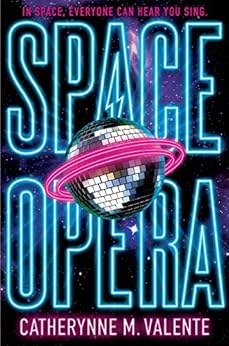The newborn and the dead and the long-suffering and the extremely well-traveled, the baby and the girl and the boys in the band and the wormholes—all of them singing the screamy bit like a song could save the world, roaring like lions and squawking like dodos and thundering like rhinoceroses and weeping like a man who died with a final mix in his hands and dancing like a kid wearing a hundred scarves and howling like an interdimensional wind tunnel of regret, belting it out with your future gurgling in your arms like sentient human goddamned beings. [loc. 3449]
Read as part of the Hugo voting pack: in short, Eurovision in Spaaaaaace! A tour de force of breathless cascades of prose, humour, invention and philosophy, freely acknowledging its debt to Douglas Adams, Space Opera is an extremely enjoyable read with some marvellous moments, a tragic poly love story, and a plethora of weird alien species (some of which feel more Banks than Adams).
The premise is simple. The intergalactic Sentience Wars -- fought over the question of what defines people, as opposed to meat -- have wreaked havoc everywhere (except Earth). In the aftermath, a more reasonable test of sentience has been developed: the Metagalactic Grand Prix, a pop music competition. The representative of the Prix appears simultaneously to everyone on Earth and explains the situation. Just don't come last, and your world will be preserved. And you'll need to pick an artist to represent you: here are some suggestions.
So all of humanity ends up being represented by two-thirds of washed-up glam rock band Decibel Jones and the Absolute Zeroes. (The third third, Mira Wonderful Star, is dead: the survivors, Decibel Jones and Oort St. Ultraviolet, are estranged, driven apart by Mira's demise and the discussion preceding it.) Dess has been living the rockstar life, albeit in Croydon, whilst Oort has been striving to be Englishblokeman, a caricature of normality. They haven't seen one another for years, and the tension between them adds an interesting counterpoint to the weirdness that awaits them at the Prix.
The prose is extravagant, the philosophical digressions (of which there are many) amusingly presented, and near-future Britain sketched lightly but bleakly (deportations, deprivation, riots et cetera). I didn't find the characters wholly emotionally engaging while I read, but I found myself thinking about Oort and Dess and Mira after I'd finished the novel: which is likely a sign that Valente sneaked in more characterisation than I noticed at the time.
A couple of minor quibbles: Piccadilly Square tube station? 'the gardenworld of Litost was a hefty journey of some sixty-five hundred miles' -- so, about the same distance from Croydon as Kuala Lumpur?
But these are minor quibbles.
I would happily read a sequel about Capo, Oort's cat, who gains the ability to speak and ends up being tested along with the humans. "I offer these temptations as a test of sentience... Whether you would sell out your homeworld or murder one of your new neighbors or let the rest of your species burn to save yourself." "I have to be honest, that all just sounds really fantastic to me," Capo meowed. "But if you could just do it for me, that would be brilliant." [loc 3010]

No comments:
Post a Comment